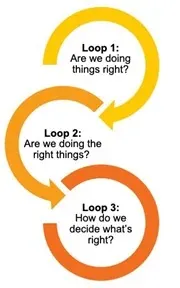Decisions, learning and resilience
Exploration of decision making, learning and resilience. Includes exploring 4 key tenets of resilience - Anticipate, Prepare, Respond, Adapt. Also links Triple Loop learning to resilience.
I delivered a session today focused on Organisation Resilience for a group of Social Leaders as part of the School For Social Entrepreneurs.
The session was an introduction to Organisational Resilience (OR) and primarily focused on the People pillar. As part of this I explored concepts of governance, decision making, culture and learning.
I introduced the OR guide, which I helped develop back in 2021. It puts principles and questions at the heart of developing Organisational Resilience. As the guide is Creative Commons, it is open to development (and has been in various ways, one of which was this toolkit.
I've been re-looking at the guide, developing different questions and also different ways of linking concepts together. I was particularly interested in how decision making and learning are potentially key to resilience, and often overlooked.
4 Phases of Resilience
Anticipate, prepare, respond, adapt. These are the 4 key 'phases' of Organisational Resilience as laid out in the guide. I come back to these again and again.
Many organisations live in the respond phase and only in the respond phase.
There is nothing wrong with being responsive. Start ups are a good example of being in the response phase, where they are actively looking for market fit, testing and responding to customer needs. They require short feedback loops to understand whether what they are doing is working. They often focus on short term, easy to measure indicators.
While there is nothing wrong with being responsive, it is draining, and doesn't build resilience.
We need to also work in the other phases, being able to anticipate challenges and opportunities, prepare for them, and ultimately adapt who we are, as an organisation.
Learning is key
To build resilience we need to learn, and learn effectively. Unfortunately learning is often seen as a nice to have, rather than fundamental to our resilience. I think this is because learning is seen as:
- Something for someone else (funders or commissioners)
- Something done on an individual level (CPD or training)
- Being difficult and a waste of money
I think if we can reframe how we think about learning, we can make massive strides as an organisation quickly.
Learning Loops
Models and concepts can be helpful in thinking about learning. There are many models. One I like is the Triple Learning Loop.

The Triple Learning Loop helps structure approaches to Organisational Learning and especially the focus of learning, AND potentially the time frames associated with Feedback Loops.
One of the insights I found interesting is that for feedback loops to work effectively, the feedback has to be orders of magnitude faster than the situation being controlled.

With this in mind you can begin to think about different activities that can help fit into different loops and think about the feedback time frame which helps us answer the questions
- Are we doing things right?
- Are we doing the right things?
- How do we decide what’s right?
Loops and resilience
As much as the triple loop is helpful, I want to also frame this in terms of resilience. So I explored which loop is more associated with which resilience phase and why.
Single-Loop Learning → Respond
- Immediate fixes to keep operations running smoothly
- Works within current rules and processes
- Typical scenario: Firefighting an urgent issue
- Swift, practical solutions
- May overlook deeper root causes
Double-Loop Learning → Anticipate & Prepare
- Questions underlying assumptions - “Why do we do it this way?”
- Encourages scenario planning and horizon scanning
- Shapes long-term readiness: - “Are we structured for the future?”
- Informs strategy and changes internal frameworks
Triple-Loop Learning → Adapt
- Transformational shifts (e.g., redefining purpose, merging with another entity)
- Adapts entire culture to a changing world
- More than a tweak can re-imagine the organisation
I think that framing this way can help us move away from learning being viewed as a nice to have, and towards something that is vital to resilience and something that any organisation can do.
What next?
I realise a lot of the above can seem abstract or only strategic. I always keen that alongside the strategic we often need simple practical things we can try. I think I'll develop this idea more. But in the meantime here's a couple of ideas to try that can help move our approach to learning forward.
- Make sure your monitoring and metrics allow you to answer the question "Are we doing things right?" in a timely manner. Short timeframes are generally better. Align to any decisions you need to make.
- Embrace open working - devote 20 -30 minutes a week to allow you and your team to reflect on what is going well, what isn't, what is challenging, what people are seeing.
- Put in monthly/quarterly sessions - maybe an hour where you explore the question “Why do we do it this way?” on a specific topic as a team. Use the weeknotes to start the culture of open reflection, use them to identify common topics that might be coming up.
Doing these 3 things will move you from being only in the Response phase, into anticipate and prepare phases. Or if you prefer from single to double loop learning.
Most important is to keep it consistent, but keep it light. Do it for 6 months or a year and see & feel the difference.
Notes:
If you are interested in the slides and resources from the session I ran, you can find them here and also in my work page.
